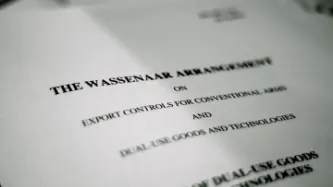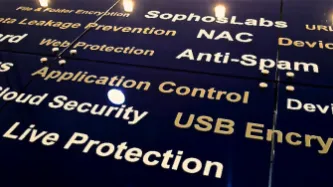Search
Content type: News & Analysis
Nine months ago, Privacy International, together with the European Centre for Constitutional and Human Rights (ECCHR), the Bahrain Center for Human Rights, Bahrain Watch and Reporters without Borders, filed complaints with the OECD against Gamma International, a company that exported the FinFisher intrusive surveillance system and Trovicor, a German company (formerly a business unit of Siemens) which sells internet monitoring and mass surveillance products. This week, we’ve…
Content type: News & Analysis
Privacy International is currently engaged in a joint project on export controls with the Open Technology Institute and Digitale Gesellschaft. The blog post below was co-written by Edin Omanovic and Tim Maurer and is also available on the OTI blog.
Export controls have something of a bad reputation in technology circles, and not without good reason.
The crypto wars that imposed draconian polices regulating how people could buy, sell and use cryptography stifled the free…
Content type: News & Analysis
What is the Wassenaar Arrangement?
The Wassenaar Arrangement on Export Controls for Conventional Arms and Dual-Use Goods and Technologies (the "Wassenaar Arrangement") is a multilateral export control regime in which 41 states participate.
The Wassenaar Arrangement was established on 12 July 1996 in Wassenaar, the Netherlands by 33 founding members to contribute to regional and international security and stability. It is the successor to COCOM, a NATO based…
Content type: News & Analysis
Update:
After an initial discussion with technical and government experts involved in drafting and negotiating the new controls on “intrusion software”, some of our initial questions have been clarified. To read what they had to say, go here.
One of the major dangers of imposing export controls on surveillance systems is the risk of overreach. While you want the scope of the systems being controlled and the language to be wide enough to catch the targeted product and its variants, you also…
Content type: News & Analysis
Update:
After an initial discussion with technical and government experts involved in drafting and negotiating the new controls on “intrusion software”, some of our initial questions have been clarified. To read what they had to say, go here.
One of the major dangers of imposing export controls on surveillance systems is the risk of overreach. While you want the scope of the systems being controlled and the language to be wide enough to catch the targeted product and its…
Content type: News & Analysis
Two new categories of surveillance systems were added into the dual-use goods and technologies control list of the Wassenaar Arrangement last week in Vienna, recognising for the first time the need to subject spying tools used by intelligence agencies and law enforcement to export controls.
While there are many questions that still need to be answered, Privacy International cautiously welcomes these additions to the Wassenaar Arrangement. Undoubtedly, these new…
Content type: News & Analysis
The following was a speech given by Carly Nyst, Head International Adovacy, at the UN Forum on Business and Human Rights, Geneva on 3 December
The internet and innovations in technologies have opened up previously unimagined possibilities for communication, expression, and empowerment. New technologies have become essential enablers of the enjoyment of human rights, from the right to education, to participation, to access to information. Today, the internet is not only a place where rights are…
Content type: News & Analysis
The proliferation of private companies across the world developing, selling and exporting surveillance systems used to violate human rights and facilitate internal repression has been largely due to the lack of any meaningful regulation.
But a huge step toward finally regulating this billion-dollar industry was taken this week, when on Wednesday night the 41 countries that make up the Wassenaar Arrangement, the key international instrument that imposes controls on the export of…
Content type: News & Analysis
Let's be clear: private surveillance companies are not just selling a product. Companies do not merely pack their product into a box and put it in the post. More often than not, surveillance firms sell a consultancy service, one that actively provides pre-sale consultancy, installation of the product, and training on how to operate the technology. When the product breaks, companies often provide ongoing technical support, with some companies sending over of consultants for up to 18 months to…
Content type: News & Analysis
If you were a Middle Eastern tyrant or a Central Asian strongman, and you suddenly found your position of power under threat, where would turn for assistance? Well, Paris, it seems, is actually pretty good start.
This week, the city that gave us a defining revolution based on the very idea that we as human beings are entitled to certain universal rights, plays host to some 1,000 exhibitors and 30,000 attendees as part of Milipol 2013, one of the world’s foremost trade shows for law enforcement…
Content type: News & Analysis
On at least two separate occasions, the South African government has provided funding to a well-resourced surveillance company for the development of mass surveillance technologies, the very equipment found to be used by the Gaddafi's repressive military regime in Libya, according to documents uncovered by Privacy International.
In February 2008, sandwiched between funding for a mechanical grape conveyor belt, and funding to improve gear changing and engine efficiency, the South African…
Content type: News & Analysis
Privacy International is pleased to announce the Surveillance Industry Index, the most comprehensive publicly available database on the private surveillance sector.
Over the last four years, Privacy International has been gathering information from various sources that details how the sector sells its technologies, what the technologies are capable of and in some cases, which governments a technology has been sold to. Through our collection of materials and brochures at surveillance trade…
Content type: News & Analysis
When a product line becomes engulfed in controversy, the PR team's first move is to distance the corporation from the damage. The surveillance market is not immune to this approach, so when companies products are found to be in use by repressive regimes, the decision many boards make is simply to sell off that technology. This increasingly repetitive narrative is failing to solve any of the problems inherent with the sale of surveillance technology and in fact, is creating more.
The …
Content type: News & Analysis
Today’s much-anticipated launch of the 2013 Aid Transparency Index, an industry standard for assessing transparency among major aid donors, shows that, despite progress, many aid agencies continue to maintain secrecy around what they are funding.
Further, for those agencies that achieved high rankings in the index, transparency alone does not prevent one of our larger concerns: aid which facilitates impermissible surveillance of communities and individuals in the developing world.…
Content type: News & Analysis
In our ongoing campaign to prevent the sale of surveillance technologies to repressive regimes, Privacy International today has filed a complaint with the South African body responsible for arms controls, asking for an investigation into South Africa-based surveillance company VASTech for the potential illegal export its technology to Libya.
In this case, Western-made surveillance technology was found by the Wall Street Journal when journalists entered the communications…
Content type: News & Analysis
For some time now, Gamma International has been criticised for exporting dangerous surveillance technologies from the UK to repressive regimes. Now, we are learning that the company is taking its show on the road, as recent reports have said that Gamma are now attempting to export its products, including the spyware FinFisher, out of Switzerland.
With sales premises registered at a site just outside the Swiss capital Bern, Gamma has now applied to the Swiss Secretariat for…
Content type: News & Analysis
This is a excerpt from a piece, written by Privacy International partners Andrei Soldatov and Irina Borogan, which appears in the Fall issue of the World Policy Journal:
In March 2013, the Bureau of Diplomatic Security at the U.S. State Department issued a warning for Americans wanting to come to the Winter Olympics in Sochi, Russia next February: Beware of SORM. The System of Operative-Investigative Measures, or SORM, is Russia’s national system of lawful interception of all…
Content type: News & Analysis
This week in London, the world's largest arms fair DSEI rolled into town, bringing together some of the world’s most sophisticated killing and torture equipment with some of the world’s worst human rights abusers. On sale this year was also some of the UK’s premier lawful interception and surveillance technology.
Considering the forum in which these technologies are being sold, and the caliber of customers looking to buy it, you would think that the sale of such…
Content type: News & Analysis
Through our Big Brother Incorporated project, Privacy International over the past two years has been campaigning against the export of surveillance technologies by Western companies to repressive regimes. One of the seminal moments of this campaign was in 2011, when we partnered with Wikileaks to release the SpyFiles, which catalogued hundreds of brochures, presentations, marketing videos, and technical specifications exposing the inner workings of the international trade in…
Content type: News & Analysis
Following reports that the Mexican prosecution authority appears to be not only using FinFisher, but also to be involved in a corruption scandal surrounding the purchase of this intrusive surveillance technology, the Mexican Permanent Commission (composed of members of the Mexican Senate and Congress) has urged Mexico's Federal Institute for Access to Public Information and Data Protection (IFAI) to investigate the use of spyware in Mexico.
The corruption scandal, which entails the…
Content type: News & Analysis
In an encouraging first response to our complaint against surveillance company Gamma International (Gamma), the UK National Contact Point (NCP) of the Organisation for Economic Cooperation and Development (OECD) announced that it will further investigate our claim against Gamma, as the evidence submitted appears to substantiate our allegations.
In February 2013, Privacy International, together with the European Center for Constitutional and Human Rights, Bahrain Watch, the Bahrain Center…
Content type: News & Analysis
The government of Pakistan has repeatedly shown it is relentless when it comes to deploying measures to censor and spy on its own citizens. Today, a report released by Citizen Lab reveals another repressive tool being used to control and prevent information being accessed on the internet -- this time with help from the Canadian web-filtering company, Netsweeper.
According to the report "O Pakistan, We Stand on Guard for Thee: An Analysis of Canada-based Netsweeper’s Role in Pakistan’s…
Content type: News & Analysis
A longer version of this article was previously published in Wired on 10 May 2013.
We all know surveillance is big in Putin’s Russia. What you may not know is that Russia’s surveillance tech is being used all over the world, even in the U.S.
The Kremlin is up to its domes in spy technology. One reason is fear, provoked by the Arab Spring, of a growing and diffuse protest movement that uses social media to organize. Notably, the authorities have taken an interest in DPI (…
Content type: News & Analysis
After a successful investigation by the US government into the illegal reselling of over a million dollars worth of surveillance equipment to the Syrian regime, Dubai distribution company Computerlinks FZCO has agreed to pay the maximum civil penalty of $2.8 million.
Computerlinks, in three separate transactions between October 2010 and May 2011, sold $1.4 million worth of devices developed by California-based Blue Coat to the state-run Syrian Telecommunications Establishment, which…
Content type: News & Analysis
A report released today by Citizen Lab has uncovered further evidence that British company Gamma International has sold their surveillance technology FinFisher to repressive regimes abroad, despite having no export licence to do so. The report builds on investigations conducted last year that demonstrated that Gamma International has been exporting FinFisher without a license to repressive regimes with dismal human rights records.
Citizen Lab has uncovered…
Content type: News & Analysis
In order to lawfully conduct communications surveillance (“lawful interception”) in the U.S. and Western Europe, a law enforcement agency must seek authorisation from a court and produce an order to a network operator or internet service provider, which is then obliged to intercept and then to deliver the requested information. In contrast, Russian Federal Security Service operatives (FSB) can conduct surveillance directly by utilising lawful interception equipment called SORM.
SORM
SORM is…
Content type: Long Read
On 1st February 2013 Privacy International, together with the European Centre for Constitutional and Human Rights (ECCHR), the Bahrain Center for Human Rights, Bahrain Watch and Reporters without Borders, filed complaints with the Organisation for Economic Cooperation and Development (OECD) against Gamma International, a company that exports “FinFisher” (or “FinSpy”) intrusive surveillance software, and Trovicor GmbH, a German company (formerly a business unit of Siemens) which also sells…
Content type: Long Read
On 1st February 2013, Privacy International, together with the European Centre for Constitutional and Human Rights (ECCHR), the Bahrain Center for Human Rights, Bahrain Watch and Reporters without Borders, filed complaints with the Organisation for Economic Cooperation and Development (OECD) against Gamma International, a company that exports “FinFisher” (or “FinSpy”) intrusive surveillance software, and Trovicor GmbH, a German company (formerly a business unit of Siemens) which also sells…
Content type: News & Analysis
On November 12, the Russian Supreme Court okayed the wiretapping of an opposition activist. The Court ruled that spying on Maxim Petlin, a regional opposition leader in Yekaterinburg, was lawful, since he had taken part in rallies where calls against extending the powers of Russia’s security services were heard. The court decided that these were demands for “extremist actions” and approved surveillance carried out by the national interception system, known as SORM.
Manned by the…


























